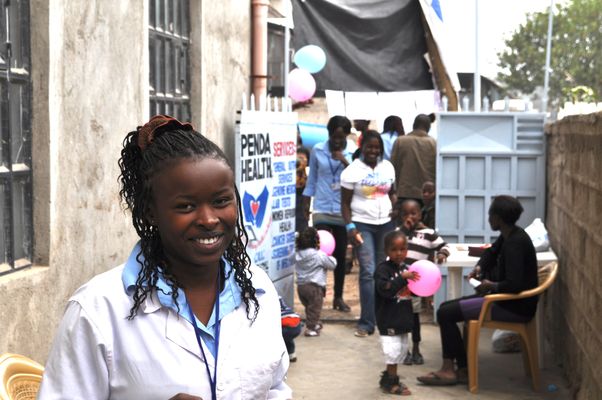Can large corporations and small entrepreneurs learn from each other? At Innovations in Healthcare, we think the answer is yes.
Recently, Innovations in Healthcare facilitated an informal information exchange between team members from Pfizer and the Pfizer Foundation (a financial supporter of Innovations in Healthcare) and innovators in East Africa that included Jacaranda Health, MicroClinic Technologies, MicroEnsure and Penda Health.
Innovations in Healthcare organizations shared their organizational journey with the Pfizer team; from what sparked the innovation, the growth path of each organization and the lessons learned as they serve the East African market.
Discussions with innovators provided insights as to how each of the organizations addressed critical health needs, and how they have improved access and quality of available health services and products using different business models and approaches.
Across the diversity of this discussion, some key insights emerged:
Customizing value: Each innovator has deepened their understanding of the customer and links that understanding to their growth. They have learned what represents value to the customer and adapted their offering accordingly. For MicroClinic Technologies this meant integrating local terms for common symptoms to Zidi their enterprise health management solution to give more accurate diagnostic support to primary care providers. Penda Health changed the look and feel of their clinics as feedback from their customers showed they associated sizeable health facilities with quality they trusted. Jacaranda Health moved from a mobile clinic model to brick-and-mortar clinics in response to their clients preferences. MicroEnsure understands that risk is pervasive for low-income groups and its value proposition minimizes the complexity of insurance with a mass-market product provided through channels that its customers already interact with and trust.
Financing of care: Who pays for healthcare remains a key question in East Africa. Financing of healthcare affects the decision to seek care early, which is critical for preventing complications in pregnancy and childbirth. Jacaranda Health’s clients face this challenge and the organization undertakes quality improvement measures that increase efficiency enabling Jacaranda to offer competitive pricing to its clients. MicroEnsure’s model innovatively works around this challenge by working with different partners such as telecommunication companies to offer micro-insurance products to their customers.
Commodities Central to Care: A typical visit to a health care provider involves health commodities such as laboratory supplies for tests, drugs or other medical supplies. Across most of East Africa, access to reliable quality medical supplies remains a challenge. This adversely affects the quality of care and patients’ trust in the healthcare system. Through Zidi, MicroClinic Technologies assists frontline health workers accurately order commodities for their facilities and the backend of the system provides aggregation of the orders to enable pooled purchasing which leads to better prices. Penda Health sees procurement as a main component of its value proposition to a price-sensitive clientele. Stock out rate is therefore a quality metric that Penda tracks as part of its clinical quality program. Penda has cultivated relationships with key suppliers to ensure timely accurate supplies.
Keep talking to the Customer: All four organizations agree that to achieve scale, they need to continually find innovative ways to keep the conversation with their customers alive. Penda Health has a robust patient feedback system with the results shared back with the teams in its clinic network. Jacaranda Health engages with its community through an Ambassador program where community champions share information on the importance of women receiving maternal health services at a health facility. MicroClinic’s flagship product Zidi is continually improved based on feedback from users while MicroEnsure attributes its large client base to integrating customer feedback over time to ensure that its product offering addresses what is important to the customer.
Innovators benefited from the exchange with Pfizer team:
“The enthusiasm of the Pfizer team for the many health innovations emerging from Africa was palpable for me - a clear reminder that, in spite of (or maybe because of!) the many challenges we face, we are having an impact on the global industry. At MicroEnsure we are finding, through our collaboration with Innovations in Healthcare, that we have to break down the silos that often dominate the health conversation," said Peter Gross from MicroEnsure.
Moka Lantum from MicroClinic Technologies said: “We can leverage each other to optimize our offering to the market and in turn provide more value to multinationals, and spur to innovative CSR/social impact strategies. The current growth opportunities will find favor in robust, well structured, partnerships between Multinationals and SMEs that seek to crack the hard to reach market.”
The Pfizer team shared their organization’s perspective across these themes and key connections were made for follow up in potential areas of collaboration.
“Our experience with the innovators from Innovations in Healthcare reinforces the need for creative approaches to improving healthcare delivery in Africa. We share the same goals to ensure all patients have access to quality health care. Innovators like these can provide clear insight on challenges that patients face in accessing healthcare. Pfizer and the Pfizer Foundation can use these insights to help inform our strategy and ultimately improve healthcare for patients that cannot access it,” said Caroline Roan - Vice President, Corporate Responsibility and President, Pfizer Foundation.
Our East Africa team will continue to support similar engagements between Innovations in Healthcare supporters and innovators to deepen learning and support the scaling of healthcare innovation in the region. For more information on how you can benefit from these learning opportunities, please contact Patricia Odero (patricia.odero@duke.edu) or Sylvia Sable (sylvia.sable@duke.edu).

